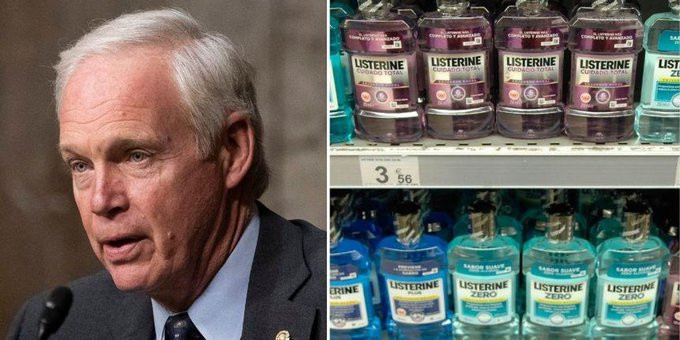
Wisconsin senator Ron Johnson has stirred controversy with his suggestion to use mouthwash as a defense against COVID-19.
During a Town Hall discussion on Thursday, December 9, the Republican lawmaker and close ally of Donald Trump referenced a study posted by the National Institutes of Health (NIH) which suggested that most standard mouthwashes contain an ingredient capable of reducing the viral load in the mouth.
In an interview with Vicki McKenna, a radio host known for sharing articles referring to the Covid-19 vaccine as a “dead baby vaccine,” Mr Johnson stated, “Standard gargle, mouthwash, has been proven to kill the coronavirus. If you get it, you may reduce viral replication. Why not try all these things?”
Johnson’s recommendation drew comparisons to former President Donald Trump’s 2020 suggestion about using disinfectants to clear the lungs of coronavirus, leading to an increase in people consuming household toxins including bleach.
Despite Johnson’s claim, the World Health Organization (WHO) has clarified that mouthwash does not kill germs within a person’s system, and that the coronavirus typically enters through the nose. However, studies have shown that mouthwash can indeed kill germs in human saliva.
Following his controversial comments, the 66-year-old senator attempted to clarify his stance on Twitter by referencing an NIH report, which states that gargling and spitting “appears to provide a modest benefit compared with placebo in reducing viral load in saliva.”
In response to the senator’s claims, two leading mouthwash brands published extensive web pages on their company sites to debunk any misconception about their products being effective preventative measures against the virus.
Crest’s website stated, “While many of our mouthwashes have been proven to kill bad breath germs … [n]one of our mouthwash products have been tested against the coronavirus and are not intended to prevent or treat COVID-19,” and added, “Consumers should follow the preventative measures recommended by their health care provider.”
Listerine’s website also provided a specific rebuttal: “Although there are recent lab-based reports (in vitro studies) of some LISTERINE® Mouthwashes having activity against enveloped viruses, including coronavirus, the available data is insufficient, and no evidence-based clinical conclusions can be drawn with regards to the anti-viral efficacy of LISTERINE® Antiseptic mouthwash at this time.” The website has made such information available since March 2020, according to a company spokesperson.
Following the brands’ response, senator Johnson released another statement, saying, “I did not say that taking vitamins, using mouthwash, would be a replacement for the vaccine, should you choose to get one.” He pointed to multiple studies, including one on the NIH website, to support his claim that mouthwash may reduce viral load.
“I continued to be amazed at the resistance to anything that might reduce the severity of COVID-19 symptoms,” he added.
